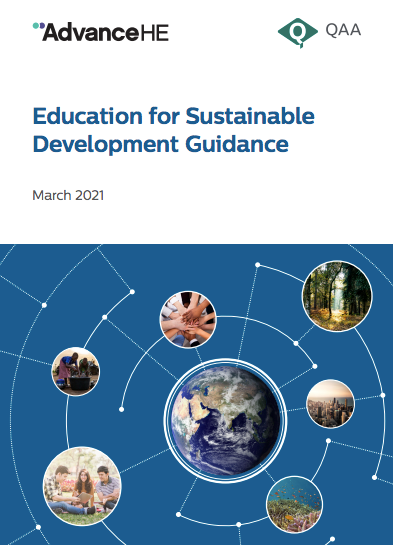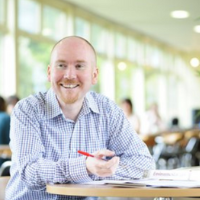Why updating subject benchmarks to include ESD is important across higher education
It is the morning of the 18th of July 2022. As I write this blog piece the UK is bracing itself for the hottest temperatures ever recorded, and much of the country is locked into the first ‘Red Extreme heat national severe weather warning’ issued by the Met Office. This is no longer a matter of dire predictions of an unsustainable future through complex scientific projections that can be difficult to accurately communicate, the national and international real-life experiences of the climate crisis are profound and are happening now.
The climate crisis is the perfect encapsulation of the challenge of sustainable development. The impacts from a changing climate have a disproportionate effect on lower-income people, communities and countries, will change the way we live as a global population, and have dire consequences for global biodiversity and ecosystem services. It has been clear to many of us working in the increasingly broad sector of sustainability for a number of years that the global challenges we are, and will be, required to tackle cannot be solved through a business as usual approach. This is most certainly the case with Education for Sustainable Development (ESD) in the Higher Education sector. There is an urgency for a new way of organising our curricula. A new way of teaching and assessing. A new way of students and staff working together. A new way of preparing our students for a greener economy. Quite simply there is a need for a new way of thinking.
 In March 2021 the Quality Assurance Agency (QAA) and Advance-HE published a new ‘Education for Sustainable Development Guidance' document for the Higher Education sector. I was lucky enough to co-chair this guidance document with Prof Jim Longhurst of UWE and a quite brilliant set of colleagues who made up the Expert Working Group. Whilst this is an important document that was written to be of use to any academic or student of any academic discipline, it was always felt the guidance was not enough on its own in terms of curriculum development. The download data are reassuringly strong: 1438 Advance HE downloads, and 4812 QAA views making it their second most visited page – quite an achievement considering the breadth of QAA work but more work was needed.
In March 2021 the Quality Assurance Agency (QAA) and Advance-HE published a new ‘Education for Sustainable Development Guidance' document for the Higher Education sector. I was lucky enough to co-chair this guidance document with Prof Jim Longhurst of UWE and a quite brilliant set of colleagues who made up the Expert Working Group. Whilst this is an important document that was written to be of use to any academic or student of any academic discipline, it was always felt the guidance was not enough on its own in terms of curriculum development. The download data are reassuringly strong: 1438 Advance HE downloads, and 4812 QAA views making it their second most visited page – quite an achievement considering the breadth of QAA work but more work was needed.The missing piece was the inclusion of ESD in the QAA Subject Benchmark Statements (SBS). Last year the QAA announced they were producing new versions of every single SBS through 2021 and 2022, and that a new section on ‘Sustainability’ was to be a standard requirement. Not an expectation, but a formal requirement for all subjects across HE. For those unfamiliar with curriculum development and delivery, the validation or revalidation of all academic programmes requires the consideration of and mapping against the discipline SBS at all universities. The requirement to include sustainability as a key requirement for curriculum planning, content and delivery in all disciplines is a potential game-changer in the quest for sustainability to be at heart of higher education. The prospect of hundreds of thousands of graduates entering employment and society every year with an enhanced understanding of sustainability, and how it relates not just to their daily lives but also their chosen career is hugely exciting. Sustainability needs to go wider and deeper than the regular subjects considered to be its natural home, such as Geography and Engineering for example. The requirement for all the freshly revised QAA Subject Benchmark Statements to include sustainability brings the challenge directly into all subject areas. For example, History may not normally be considered one of the disciplines to engage with sustainability. However, the following excerpt from the revised 2022 QAA History SBS clearly shows just how carefully this has been considered by colleagues, and how it is now required to be part of all History curricula.
Sustainability
1.16 The study of history addresses social, environmental and economic concerns with the aim of creating a better world. The discipline can contribute towards achievement of the UN Sustainable Development Goals, partly in terms of disciplinary content, and partly via disciplinary method (QAA and Advance HE, Education for Sustainable Development Guidance). Environmental history in particular brings to the fore understanding of the interaction between nature and culture; how humans have affected the natural environments of the past; and how current problems are legacies of the past. However, public history, economic history and cultural history also focus on key aspects of sustainability.
1.17 History courses can also contribute to sustainability through their connection with heritage and work around conservation, preservation and learning from the past to plan for the future. In this respect, there are demonstrable links between the subfields of environmental history and public history.
1.18 More broadly, history prepares students to meet sustainability needs and challenges through its inherent attention to issues of change, continuity and causation; its demand for multi-perspectivity and multi-factorial understanding of events, issues and problems; its appreciation of the relationships between economic, political, cultural, social and environmental factors and systems; its ability to observe processes taking place in more than one place and more than one time; and its acknowledgement that there are rarely simple answers to problems. In fostering this critical mindset, history therefore equips graduates to respond creatively and flexibly not only to current environmental needs, but those not yet identified and those that may emerge in the future.
This change in all Subject Benchmark Statements and therefore university curricula is arguably the biggest step forward for sustainability in higher education and the implications for societal, economic and environmental change. Our next challenge is to embed sustainability so deeply into students, staff, institutions, and across the whole sector it is simply the norm. That may be a challenge for a less intimidatingly hot day, but I fear those days may be declining.











